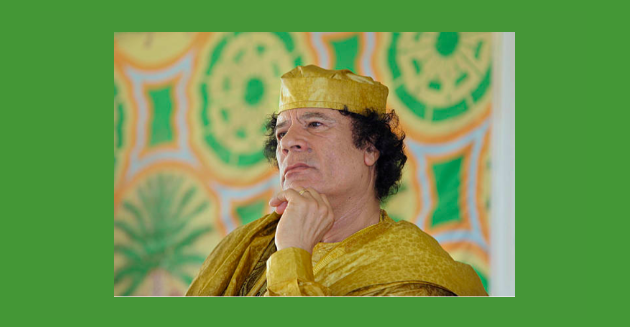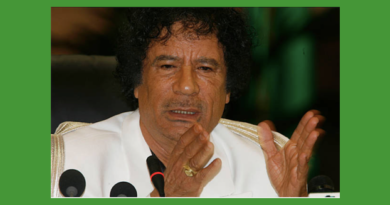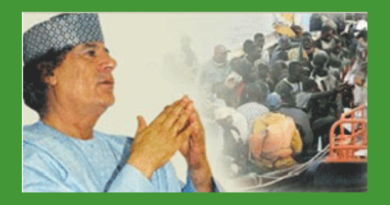Leader addresses Judicial Bodies
The Leader of the Revolution Speaks to the Supreme Council of Judicial Bodies and to the Chiefs of Judicial Bodies
22.10.2004
In his meeting with the members of the Supreme Council of Judicial Bodies in the Great Jamahiriya, the leader of the revolution made an important speech. In it, he called upon the Libyan people to annul all exceptional courts like the Special People’s Court. He also appealed to the people to abrogate the penal laws enacted by the Revolutionary Command Council before the establishment of the sovereignty of the Masses, and to return to the normal penal code and procedure.
He also demanded that a definitive investigation in the case of the Abi Selim Prison be expeditiously carried out. He appealed for the cessation of any action such as arrest without warrant or extra-judicial punishment, should they exist.
He said that no detainee or prisoner should be denied the right to see his family or meet with his attorney. He/she must have the right to choose his own counsel from outside the ranks of the People’s Counsel. Prisoners must continue to have the right to family visits outside prison on special social occasions.
The Leader of the Revolution appealed to the Libyan people to swiftly ratify the anti-torture conventions. He strongly deplored the conduct of governments that have not done so. He condemned the countries that oppress detainees and those that allow such acts to be conducted, by their police forces or prison authorities, with impunity.
The Leader expressed his heartfelt regret that some governments carry out such acts against their own citizens and against foreigners alike. That sad fact was stressed in the reports of Amnesty International that he put before those present in the meeting. He called upon the Popular Justice Committees in Libya to cooperate with Amnesty International and other human rights organizations. He commended the efforts made by those organizations. He demanded that Libya, by virtue of being the first state of the masses in the whole world, play a pioneering role on the world level in the defense of human rights.
The following was mentioned in his speech:
In the name of God.
In meeting with this elite group of jurists in the Jamahiriya, my purpose was to address certain subjects that need reflection. In the early days of the revolution, certain legislation was made in response to the needs of that stage. All politicians and jurists are aware that a revolution must be accompanied by certain harsh measures. Those measures must be time-bound and of exceptional nature, like wartime legislation. Such measures cannot be permanent or else they would constitute a denial of justice. They must be reconsidered. It was our hope that Libya with its revolution would become a model of freedom, popular democracy, and the state free from oppression and injustice. However, with the measures I mentioned above, Libya became another conventional state, even a dictatorial or police state. This is deeply regrettable. We are not like that nor do we want to be like that.
It so happens that we are in the Third World, in a region that is branded as backward. It was difficult for the world to distinguish between what happened here and any other Coup d’état that took place in Sudan, Iraq, Mali, Indonesia, or Argentina. All the events of the last year were purely superficial. They brought all sorts of oppression and injustice. This is perfectly normal since military generals carry out this kind of action in those countries. For us in Libya, it would be unfair to have us in this list. We are not generals who led a Coup. We led a popular revolution for which we used the army. This means we had a doctrine and an ideology. The Libyan revolution was a correction of the events in the Third World. Yes there was a military action accompanied by some injustice. Nevertheless at a very early stage, the power was returned to the people. The popular committees were established and they put before the peoples’ congresses their draft laws and policies. We, the leaders of the revolution, are witnessing the people creating their own committees and entities that are conducting the business of the society of the masses. There is no way for us to enact a law that runs counter to the will of the people. But some of the measures that were supposed to be temporary, somehow, continued to live with us. For example, the People’s Court was established at the beginning of the revolution. In each and every Third World country, when there is a revolution or a Coup, they establish a court named the “Revolution Court”. Its judges are military men and generals. That was the case in Syria, Iraq, and even in Egypt at the beginning of its revolution. For us, even the name would not stand. As we said, our movement was a correction of all the events that happened in other Third World countries. We called it the “People’s Court” because the Revolution was a People’s Revolution. The People’s Court was made up of a military man, a member of the police, a member of the clergy, and the civilian man of law. We could have composed it of young officers like all such courts in the Third World. But its composition was meant to ensure that it was a People’s Court. Anyway, this court continued with us until the year 2000. This should not have happened. Why should we have a special court when we are not in a state of war, anarchy, or upheaval? Human rights organizations and Amnesty International address this question and justifiably. The statute of the court was amended four times. This is proof that it is no longer fit for the new stage.
The People’s Court was supposed to try the officials of the monarchy who exercised power before the revolution. After their trial, the court should have ceased to exist. Unfortunately, this was not the case. We started amending it and giving it additional powers. I was amazed to see that someone who sold his farm was referred to the People’s Court. Why? Because his farm was given to him by the state and selling it was a violation of the law. Another person slammed his car into a lamp post, and he too was referred to the People’s Court! Supposedly because the lamp post is public property and running into it is a violation of the law. This is a farce. It is laughable. Could the People’s Court be asked to look into such petty things? Its statute was modified four times in order for it to be able to deal with these new cases that are not within its jurisdiction. My hope is that you would draft a law to put before the popular conference in order to put an end to the existence of the People’s Court. Its mandate and jurisdiction should be transferred to regular courts.
We are not the United States. They say they were subjected to a terrorist attack. They enacted special laws, created special courts, reestablished a ministry of the interior, they have Guantánamo and extra judicial measures. They say: “we are at a world war against terrorism; therefore, we must have special measures”. We are not like America. We are not at war. We don’t need special measures to face an outside enemy or to win a war. Why should we have these special measures in a calm and stable country like ours? There is no power struggle in our country. Power is in the hand of the people. Our men and women make the laws, make the decisions, determine the policy of the country, and set its budget. We have no civil war. We have no external war. We have no power struggle. Our society is homogeneous linguistically, religiously, and ethnically. It is a blessing from God that we have such a calm, stable, and content society. Why should we resort to exceptional measures? Because China did? Because Iraq did? Because Syria did? Because I don’t know who did? They have their problems. The US did that, and so did Britain because they are in a state of war. They are scared and terrified. Their fear makes them overreact to the smallest of emergencies and resort to exceptional measure. We don’t have that. Even if America enacts all sorts of exceptional measures, we will not do the same. Every society has its own circumstances. We are a coherent, stable, and calm society that has absolutely no problems. Why should we resort to exceptional measures? Just by way of imitation? Long ago people joked that Arab communists carried their umbrellas in Aden when it snowed in Moscow. Because communists mimicked what happened in Russia, even if they had never seen snow in their lives!
What I need to say is that the People’s Court is no longer necessary. It’s supposed to have ended. We appreciate the efforts of its founders, and its efforts to hold to account those who exploited the Libyan people from October 1951to 1969. We should start a normal stage with regular procedures. In 1969, the Revolutionary Command Council adopted the law on the protection of the revolution. That was justifiable at that time. Today, after the establishment of the people’s power, we can no longer talk about the defense of the revolution. We could only talk about the protection of the power of the people and the maintenance of the system of the masses which constitutes the basis of our state. The law was necessary at the time of its adoption. Things were fluid and unpredictable. There used to be five American military bases and a number of British ones. Cyrenaica was completely occupied by the British. There were twenty thousand Italian settlers who controlled all economic activity in Libya. The remnants of the old regime were still active inside and outside the country. It was possible for all those to conspire against the revolution. Therefore it was necessary to adopt a law on the protection of the revolution that provides for severe punishments for any attempts against it. After a while Libya achieved independence and ended the military, economic, and settler colonialism. The revolutionary command council ceased to exist. It was replaced by the people’s power. The republic was replaced by the Jamahiriya. There is no longer a justification for the existence of that law or for us to continue to invoke it. There are other laws that should be sufficient to protect our system of popular direct democracy without resort to any special or exceptional measures.
The establishment of the people’s court led to the establishment of the office of the special prosecutor for the security of the revolution. Now we have regular court system and regular offices of prosecutors so why should we need to continue to have that special office? It would have been possible at the time of the revolution, for us not to enact any special laws or provide for any special punishments. It could have been assumed that the old laws came to an end with the beginning of the revolutionary era. We could have run the country without those laws. However, I thought it was necessary for us to enact a law to protect the revolution and a new status. By their very nature, exceptional measures create fear and result in oppression. All Third World countries that established special courts, military courts, and adopted oppressive laws were not spared conflicts and upheaval. They never achieved stability. Those laws did not provide the solution. The real solution lies in a change in the nature of the people and the society. Normally, in every society there is a struggle for power, either among individuals, political parties, tribes, families, or social classes. The solution cannot be found in laws. To provide a radical solution for the problem, there is a need to end the power struggle. Not to frighten those who struggle for it. The struggle for power comes to an end when all the people exercise power, like the situation in Libya now. All adult Libyan men and woman, exercise power, and therefore there is no struggle for it. Anyone with an opinion can express it in the People’s Congresses and try to persuade others of it. The Office of the Special Prosecutor is no longer necessary.
There is another law that criminalizes partisanship. There is no objection to the idea itself. My personal objection is to the severe punishments included in it. There is also the fact that with the establishment of the power of the people no such act could take place. If somebody suggests that a political party be established, what would be the use of it? Nobody will join it in a country where the people run their own affairs in direct democracy. Parties and partisanship are completely outdated. They belong in museums. This is the era of the masses. The world is full of parties that have never solved the problems of their societies. If I establish a party, people would think that it is simply lust for power and wealth. People will ask themselves if they should vote for us so that we can rule them and monopolize power and wealth. The ruling party in any country benefits only its members. Even within the party itself, the members charge its central committee of usurping the power of the party and monopolizing its money and that is shows total disregard to the members of the party. Then the central committee itself accuses the politburo of dictatorship and monopoly. So in the final analysis the party is made up of no more than five people who are the members of the politburo. Even the politburo itself usually accuses the chairman of the party of dictatorship and of showing no regard to the politburo. This is what happened with Brezhnev, Gorbachev and Suharto. So what parties are they talking about?
The parties do nothing. When people have grievances, they take to the street and the members of the parties are nowhere to be found. People opposed to the war in Iraq, the unemployed, and the poor go out on the street to demonstrate. Violence spreads, and the parties do nothing. People will not establish a party in this day and age. Our people exercise power by themselves. Why should they hand over their power to a party or to a group of people to control them? Take the example of Lebanon. It is made up of many communities. Its political system is sectarian. The president must be Christian and the Prime Minister must be a Sunni Muslim. And the minister of the interior must be a Druze. In the seventies or the eighties a general whose name I don’t remember moved the army, went to the radio station, and broadcast a statement saying that the army has seized power in Lebanon. But nothing changed the following morning. The parliament remained with its sectarian composition unchanged. The general was not even tried. They just asked him what you think you’re doing. The communal and sectarian system is the basis of the government. Can you turn a Christian into a Muslim or a Muslim into a Christian? Nobody in Lebanon could possibly think of a military Coup because all communities are represented in the parliament and in the cabinet. Here we have our People’s Congresses and popular committees. What do we do with parties? They have no role in our system. Therefore, there is no need to give any importance to partisanship. It could be resisted or we could impose severe punishments for it. But in fact, partisanship is over in the whole world. This old model of political parties can no longer express the new reality. All old models like the rule of an individual, a party, or a family, have come to and end. We should not be talking about parties but rather about securing the fabric of the social institutions. All actions, conduct, and behavior must make sure that this fabric is unharmed. This is the very basis of all the constitutions of the world including those that claim to be democratic. Look at the French constitution for instance. It talks about the rights of the human being and the citizen. In order for these rights to be respected, the constitution must be preserved. All actions of the French citizens must not run counter to the constitution. If you infringe the constitution, you are in a collision course with the society and the whole establishment, you can be tried, imprisoned, and be faced with severe punishments. Like they say, the constitution must be preserved; we say that the purpose of all actions must be the protection of the Jamahiriya, the system of the masses and the power of the people. No one is allowed to infringe upon the social establishment. There is also the principle of the people’s sovereignty. That sovereignty is inherent in the people and nobody can exercise without their consent. No one can claim sovereignty for themselves. All the constitutions of the world state that sovereignty belongs to the people and it is exercised through their representatives. Why should it be exercised through representatives? The people can exercise their sovereignty directly. Why should they be denied that right in favor of a small group of representatives? In our system this is a sacrosanct principle. Anyone who challenges it challenges the very fabric of our society and does harm to our social institutions. Therefore, they must be punished to the full extent of the law. Everywhere in the world, people have the freedom to do what they wish, without doing harm to the society. The same applies here. If one attacks the Jamahiriya and the power of the people, he is attacking the whole social institution. This is an indisputable fact. The democratic constitution of the federal republic of Germany, states the Germans have the right of assembly, without need for prior notification, provided it is calm and unarmed. Public assembly requires prior notification. This clearly means that certain actions can only be carried out in accordance with the law in Germany, and other democratic countries. Same applies in France. No anti-republican group would be allowed to organize there. Now In certain Muslim countries, some people start organizing and following certain rituals. This runs counter to the law. They claim that their brand of Islam is better than ours. They change even the rules of prayer. They do not pray at home or in the mosque. They go and pray in public squares. This is undermining the whole religious system of the society. There is no provision in Islam for adopting this unusual form of prayer. If somebody wishes to fast for 40 days, it’s his choice. Nobody will prevent him from doing so or fasting his whole life if he so wishes. But, to start a party or an organization, and to start advocating this idea is an attack on the foundations of religion. It is unacceptable anywhere in the world. Not in France, not in Switzerland, and definitely not in Libya. French law states that it is forbidden to display religious symbols in public schools; no cross, no Star of David, and no Muslim head cover. They say you are free to exercise your faith at home or in a house of worship. It is not acceptable to create distinction among communities in the same society. You must be seen to be French only not followers of one Religion or the other. France is not a mosque or a Church. France is a secular state. When asked why the head cover was banned, the answer was: “At school, you must be seen only as a teacher. To be seen as a follower of a certain religion could put you against the followers of another religion.” In public institutions people must be seen as French, they must keep their faith to themselves, and exercise it in houses of worship. Otherwise, the country will be divided on religious basis. For us in Libya, we are all Sunni Muslims. Why should anybody adopt new rituals, new thought, or new distinguishing marks? This is unacceptable, it undermines the whole society. Anyone can stand on a street corner and preach good behavior and pious conduct. But what is the purpose of gathering a secret underground group? Is it to undermine the whole society? This is totally unacceptable, everywhere in the world.
Under the constitution, Germans have the right to form organizations. It also provides for a prohibition of organizations whose purposes are unlawful or against the system of government or destroys the harmony of the society. This is included in the German constitution. Can anyone accuse Germany of being an authoritarian or dictatorial state? There is a consensus on the German system of government and its institutions. No one is allowed to attempt to undermine them. If you call for the establishment of revolutionary committees to rule Germany or to hand over the power to the people, you are undermining the society and committing an unlawful act. There is another article that is very clear. Anyone who abuses the freedom of expression with the purpose of undermining the basic democratic system shall be stripped of those fundamental rights. Even a phone call, if used to jeopardize what they consider a free democratic system, will lead to legal accountability and a denial of constitutional rights. What I mean to say is even in the countries that are considered modern and democratic; there are laws to protect the social institutions and the fabric of the society. A society is like a structure built on pillars. No one has the right to tear down one of the pillars because that will bring down the whole structure. No pretext, religious, political, economic or ideological would permit tampering with the basic structure of the institution. In Germany, the confidentiality of contacts, correspondence and phone calls is guaranteed. However, if any of them is used to fight against the basic free democratic system, that guarantee is annulled. One is stripped of those fundamental rights. That means that his phone is tapped. You could use your phone for any purpose you like; harass people, use foul language or even steal. But if you attack the social institutions, the right to privacy is annulled. Even your pets will be tapped. The right to property is also conditional upon respect for the basic free democratic system. If your house, store, vehicle or farm is used for the purpose of harming the social institution or the system of government, you would lose it. In the Western countries suspects have an electronic homing device implanted in their bodies. They are under surveillance every minute of the day because their activities threaten the society. Even the multi-party system has to observe those rules. The court can rule that any party is unconstitutional and ban its activities if its program is a threat to the free democratic system or to the existence of the republic. Therefore, no one can establish a political party in Germany if it is incompatible with its basic system. A call to regulate or change the party system in Germany would be accused of dictatorship. They say we have a democratic and constitutional order. These are two sides of the same coin. The society and its institutions are sacrosanct and cannot be tampered with. The laws are there to protect the society and its order. The order we have in Libya is the Jamahiriya of the people’s power. The faith is Islam and the doctrine is popular socialism. These are the pillars of the society. It is forbidden to attempt to shake or undermine them.
In Germany you cannot establish a political party at whim. Haidar in Austria for instance, he established a party and was immediately told that his was a right wing, fascist party and that it would not be allowed to reach power. In France the same thing happened. So, while they speak of the freedom to form parties, they maintain that the parties that disrupt the established order are not allowed to come into existence. The system is free and democratic, but to attempt to destroy it and build something different in its place is not allowed. I have the German constitution in front of me. There is another article that deals with the freedom of worship. That freedom is guaranteed as long as it is compatible with public order and morality. In Switzerland it is forbidden to exercise a faith that runs counter to the public order and morality. In Switzerland where people seek asylum, measures are taken to protect the public order, social peace and to prevent the Church from infringing upon people’s rights. The Church in Switzerland cannot detract from the rights of the people or criticize the order of the State. Can someone call for German to be the sole official language in Switzerland? Of course not, because the constitution stipulates that the official languages are French, Italian and German. No archdiocese could be established on Swiss territory without the approval of the federation. The federal government lays down the rules that regulate radio and television and other mass media. The task of the media is to educate and entertain the viewers while taking into account the specific characteristics of the country and the special needs of the cantons. No radio station or newspaper can operate if it does not take the specific character of Switzerland into account. Switzerland is made up of four peoples that united together. German, French, Italian and Flemish peoples make up the country. It is forbidden to start a radio station that calls for the independence of the French or German part. The media in Switzerland must observe the public order and the character of the society. The freedom and independence of the media are guaranteed within the limits set in the article I just cited. Even in Switzerland, there are limits on the media.
Citizens in Switzerland have the right to form political parties or associations provided that none of their goals or methods is illegal or constitute a threat to the state. The laws and regulations stipulate the measures necessary to deter the violation of these provisions. The Swiss constitution speaks of deterring anyone who might threaten the state. A Swiss citizen cannot receive anything from a foreign country. They cannot receive gifts, decorations or money. As a citizen of a state, it is forbidden to visit certain states. You have all heard of the case of Abdul Rahman Al-Amoudi; an Arab-American who is currently on trial. He is likely to be sentenced to one hundred years in jail because he visited Libya a number of times. A Swiss citizen cannot be deprived of his political rights unless he threatens the social institution. Some fools from the Third World go to seek asylum in Switzerland then proceed to demand things that are unheard of in that country. Of course they deport him immediately. He labors under the illusion that they will allow him to undermine Swiss institutions.




